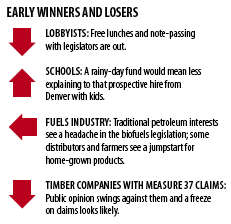 If you’re still basking in the sunshine moment of last month when the state’s major business groups spoke with one voice to the Oregon Senate Revenue committee, it’s now safe to take off your shades.
If you’re still basking in the sunshine moment of last month when the state’s major business groups spoke with one voice to the Oregon Senate Revenue committee, it’s now safe to take off your shades.
 By Oakley Brooks By Oakley Brooks |
If you’re still basking in the sunshine moment of last month when the state’s major business groups spoke with one voice to the Oregon Senate Revenue committee, it’s now safe to take off your shades. It was a historic scene, sure. But even as the Oregon Business Association, Associated Oregon Industries and high-tech lobby AeA, among others, stated their support for the suspension of the corporate “kicker” tax refund and diverting the $275 million into a reserve fund, there were some fractures and grumbling below the surface. A look at this and other harsh realities as the Legislature rolls into a third month…
CAPITAL TO BE GAINED?
As the hearings about the corporate kicker got under way, House Minority Leader Wayne Scott (R-Canby) proposed affixing capital gains and inheritance tax reductions to suspension of the corporate kicker. One of AOI’s lobbyists also voiced support for tax reductions as part of the kicker suspension. (The kicker is money “kicked back” to companies and individuals when state tax revenues are more than 2% better than projections.)
Meanwhile, OBA’s president Lynn Lundquist stated flatly “that’s not our choice” for how to write new kicker legislation. Neither Democrats in the Legislature nor Gov. Ted Kulongoski favor linking tax cuts to the kicker discussion. “The governor is more interested in talking about that as part of a broader tax reform discussion down the road,” says Kulongski spokesman Jake Weigler. “As it stands, changing the kicker would already be the most significant tax reform in 20 years.” The linked tax cuts briefly took on some intrigue because the kicker is enshrined in the state constitution and any changes would require a two-thirds vote in both bodies. Democrats holding the majority in both houses still needed some votes from Scott’s caucus to pass the suspension.
Neither Democrats in the Legislature nor Gov. Ted Kulongoski favor linking tax cuts to the kicker discussion. “The governor is more interested in talking about that as part of a broader tax reform discussion down the road,” says Kulongski spokesman Jake Weigler. “As it stands, changing the kicker would already be the most significant tax reform in 20 years.” The linked tax cuts briefly took on some intrigue because the kicker is enshrined in the state constitution and any changes would require a two-thirds vote in both bodies. Democrats holding the majority in both houses still needed some votes from Scott’s caucus to pass the suspension.
But, as of late February, Democrats had installed a safety valve to counter Republicans who might stall the kicker bill — legislation that referred the kicker diversion to voters in May. That could pass by simple majority in both chambers. And it would kick tax cuts right out of the discussion.
RENEWABLE ENERGY, RENEWED BATTLE
Last session, a bill promoting biofuels broke down after partisan bickering involving business interests. But with similar legislation moving swiftly this year, renewable energy for electricity is the issue that’s causing some division in the Oregon business community. This, even after lengthy discussions over the past year in the governor’s renewable energy working group, which included industry representatives, power companies, public interest groups and clean-energy proponents.
At a final meeting of the working group last month before the legislation was expected to start moving in the Senate, some industry groups were still worried that getting more electricity from solar, wind, geothermal and biomass — 5% by 2011; 25% by 2025 — would hurt the state’s business competitiveness. “Today, we pick the power source with the least cost and least [future] risk,” says Mike Early with Industrial Customers of Northwest Utilities (ICNU), which represents some of the state’s biggest power buyers such as Boeing and Weyerhaeuser. “With this legislation, we’re not going to pick that. We don’t think mandates are appropriate and I don’t think we can support the bill as it’s currently written.”
Sen. Brad Avakian (D-Bethany), who is sponsoring the bill, counters that the cost increases will pale in comparison to long-term cost and global-warming risks associated with reliance on fossil fuels. He also planned to include a provision capping the amount utilities would be required to pay each year to meet renewable energy targets. “Everybody will see a small increase in electricity rates but it’s important to not be shortsighted about this,” Avakian says. “In time, it’s going to be more efficient and affordable.”
More than 100 Oregon business people who signed a pro-renewables petition recently circulated by energy venture capitalist Nancy Floyd agree with Avakian. But that letter revealed that there’s even some division within companies on this issue. While ICNU — which is against the bill — counts Intel as one of its members, Intel Capital strategic investment director Stephen Saltzman signed on with Floyd’s group.
Avakian plans to put the disputes to rest sometime soon. The bill should go to the Senate floor in early March. And he says, “There should be enough votes to pass it,” and send it on to the House.
Have an opinion? E-mail [email protected]


